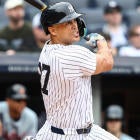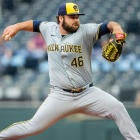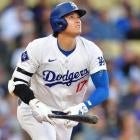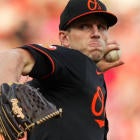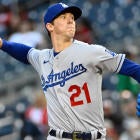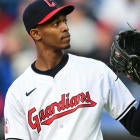Rotisserie drafts are obviously much different than normal Head-to-Head leagues because you don't have to worry about a hitter's strikeouts being deducted. And you don't have to worry about a pitcher getting tagged with a 2-1 loss since only wins are counted in Rotisserie. Here are a few things to think about as you head into your Rotisserie drafts.
The past affects the future
The power hitting numbers dipped from 2004 to 2005, with 37 batters hitting 30 or more homers in '04 down to 27 batters hitting over 30 in '05. That number rebounded in a big way last season, when 34 batters hit 30 homers and two more hit 40 or more homers than the previous year. There were also more runs scored overall last year than in '05, so the initial thoughts that the crackdown on steroid abuse would curtail scoring has been debunked -- for now at least.
| 2007 DRAFT GUIDE! | ||
|
|
||

|
||
| Order your copy today! | ||
So with power back in the game, that has to mean that there was a drop in steals, right?. Not so fast! In both '04 and '05, there were 27 players who stole at least 20 bases. That number jumped to 35 last season. Not convinced? How about this: There were only five players in '04 who stole at least 40 bases. That number more than doubled last season with 11 nabbing at least 40 bags.
What does this mean to you? It means you can wait on steals and bulk up on extra power since stolen bases aren't quite as valuable.
Stealing hearts
Last season, I ran some numbers to see how a stolen base compared to a home run in Rotisserie play. Without delving too deeply back into the stats and numbers, it ended up that a 30-HR hitter, including RBI and runs scored, was about as valuable as a 20-SB player, with runs scored also considered. So does that make Richie Sexson worth as much as B.J. Upton? We project Sexson to hit about 35 homers and Bossman Jr. to steal around 23 bags. Those owners with Sexson in tow (he has been getting drafted around the ninth round) would argue that before the season starts, the big man has much better Rotisserie value, which is very true (Upton is getting picked up in the 16th-18th rounds). But say Upton can improve enough defensively at third base to own a spot in the lineup, he has much greater Rotisserie potential than Sexson because of his power and speed, so this could become a decent trade later in early summer.
What's important to remember with stolen bases is that you can attack the category in several ways.
- Figure that you can likely rank in the top third in steals if you finish with about 170 total SBs in a mixed league. It would be hard to do that without at least one 40-base stealer on your roster. You can still get solid Rotisserie points by having several 20-SB players.
- You can draft two stud base-stealers, get a big lead in steals, then trade one of them off (preferably the more one-dimensional base-stealer) for help in power or pitching, depending on where you deem the biggest deficit is on your squad.
- If you leave the draft without much of a chance in the steals category, you can always make a trade. Steals and saves are the only two categories that you can receive a huge boost in Rotisserie value by just making one trade. So wait a month or so, then target someone with depth in steals and possibly an injured star, then offer them help with your surplus of power or pitching.
- Punting a category is an extremely difficult way to try to win a 10-category Rotisserie league. Everything has to go well in the other categories and you pretty much have to stay injury free. So instead of punting the category, try to pace yourself to at least land in the middle of the category, which means a steals total of around 125 to 150.
Making your pitch
It's easy to say, "Don't draft anyone that can kill you any one category," but it's much harder to do. In pitching, for instance, you might find yourself with a bunch of good pitchers on bad teams, which lines you up for the lower echelon in the wins category. So you start perusing through the available pitchers late in your draft and decide to go with a mediocre pitcher on a good team, like Ted Lilly or Jon Lieber and, just like that, your team's ERA and WHIP is sacrificed for a handful of wins.
Or you could be deficient in saves toward the end of your draft, so you grab someone like Seth McClung from Tampa Bay, despite his penchant for giving up runs by the handful. Your desire to get back in the saves races just cost you in at least two other categories.
Wins is one of the more difficult categories to project for a pitcher because so much of that depends on his supporting cast. His hitters need to get him a lead while he's pitching -- and they need to keep it -- and his bullpen needs to shut down the opposing team's hitters late in the game.
Breaking down backstops
Almost all Rotisserie leagues require two starting catchers, which means there is a great division between the top catchers and the 20-24th best catchers. Since there aren't many players at this position that can help you in many categories, you want to do your best to at least get ones that don't kill you in any categories.
For those reasons, Victor Martinez, Joe Mauer and Brian McCann are even more valuable at this position than their counterparts, making them the only ones to consider spending an early-round draft pick on. Not only do they not hurt you, but they help you in batting average, power and RBI. Don't expect any help in stolen bases, obviously.
The remainder of the catchers are in different levels of quality, but if you miss out on the Big Three, worry about shoring up your other positions before dipping into the catching well. Figure that the 10-12th catchers aren't that much worse than the fourth-ninth.
Wrapping things up
Instead of waiting until the end of your draft to figure out what you are going to do at the end of your draft, you should know well in advance what you'll want to accomplish with your final three or so picks.
Try to save your DH spot -- unless you draft David Ortiz, Travis Hafner or Frank Thomas early on -- until the 19th or 20th rounds, so you can capitalize on any solid hitter falling through the cracks among outfielders or corner men.
Since you have to fill a middle infield roster spot as well, save that until the end also. You can probably look at your cheat sheets or a couple of mock drafts to get an idea as to which ones should be available to you. Chris Burke, Luis Castillo and Orlando Hudson are three names that pop up as possibilities that won't hurt your batting average.
Cincinnati's David Ross and Boston's Jason Varitek should be considered before that second run of catchers late in your draft. Grabbing them as your No. 2 catcher before everyone else starts filling out their catchers means the difference of a solid Rotisserie contributor like Ross or the bland talents of someone like Miguel Olivo or Brian Schneider.
Have a question for the Fantasy Baseball writers? How about a comment or a suggestion? Feel free to email us at DMFantasyBaseball@cbs.com. Please add "Attn: Rotisserie" so we know which column you are referring to. We might not be able to answer all questions due to a large volume, but we’ll do our best.












